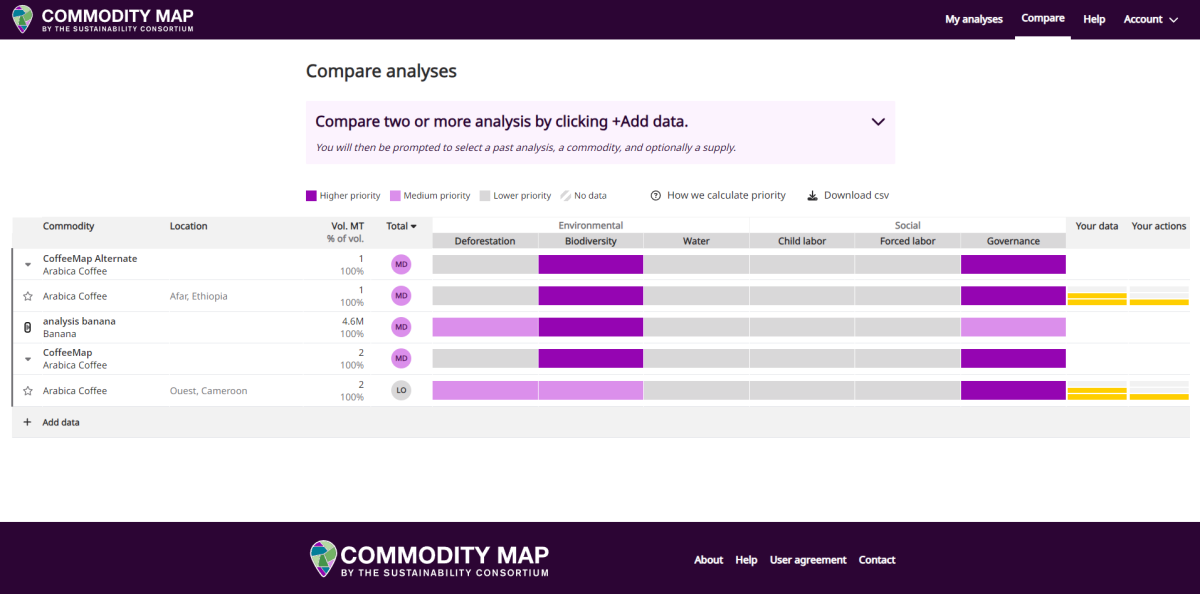New free, science-based tool offers insights into sustainability priorities

Photo courtesy iStock/Getty Images
While more and more businesses are beginning to recognize the benefits of sustainable practices, putting them into action can be confusing and time consuming.
The Sustainability Consortium (TSC), a global organization focused on increasing sustainability in the consumer goods industry, hopes to change that with a cloud-based tool designed to predict environmental and social priorities in agricultural supply chains.
The launch of the cutting-edge CommodityMap predictor marks the first new tool launched by TSC since they relocated their headquarters to Arizona State University’s Julie Ann Wrigley Global Futures Laboratory earlier this year.
Available for free and open to the public, CommodityMap empowers businesses to make informed decisions and take action toward sustainability in their sourcing practices. CommodityMap simplifies supply chains, which are often complex, using geospatial analytics. The tool helps users understand the sustainability problems in the locations where their commodities are grown or sourced, making complex sustainability data for their agricultural products easier to access.
With just the country of import, companies and individuals alike can use this tool to perform comprehensive analyses, prioritize efforts and receive science-based recommendations for action.
“We are excited to offer this powerful tool to companies striving to improve the sustainability of their supply chains,” said Christy Slay, CEO of TSC and a senior Global Futures scientist. “CommodityMap allows businesses not only to identify and prioritize sustainability issues, but also to provide guidance on actions that improve commodity supply chains.”
Key features of CommodityMap include:
- Insights without complex data collection: The platform leverages a proprietary model linking trade statistics to production regions, eliminating the need for time-consuming data collection.
- Science-based recommendations: Users receive actionable recommendations grounded in scientific research, enabling them to effectively drive transparency and address their most pressing sustainability challenges.
- Education and engagement opportunities: CommodityMap provides easy-to-interpret metrics and recommendations that facilitate communication and collaboration with stakeholders across the supply chain.
- Action and comparative analyses: Companies can prioritize issues, compare analyses and take demonstrable actions to address environmental and social concerns.
The launch of CommodityMap marks a significant step toward creating a more sustainable consumer goods industry. Slay said that as companies continue to prioritize sustainability, tools like CommodityMap will play a crucial role in guiding their efforts toward meaningful impact.
CommodityMap builds upon TSC’s commitment to translating sustainability science into practical business tools. With funding provided by the Walmart Foundation, TSC has transformed its existing commodity mapping tool into an accessible online resource covering the global production of over 100 commodities.
“We believe that access to information is key to driving positive change in supply chains,” said Greg Bohrer, director at the Walmart Foundation. “By increasing transparency and understanding of environmental and social issues, the CommodityMap platform equips companies with the insights and actionable recommendations needed to build more sustainable value chains.”
TSC is hosting a webinar overview of CommodityMap at 1 p.m., Central Standard Time, on June 25, including a demo of the tool, user testimonials and a Q&A. Anyone interested in exploring the features and outputs of the platform is welcome to register and attend.
More Environment and sustainability

ASU President Michael Crow named to TIME100 Climate list
Arizona State University President Michael Crow has been named to the 2024 TIME100 Climate list of leaders and innovators driving real climate action.The list includes leaders across a range of…

Driving green desalination
Wilderness survival TV show hosts, pirates and water treatment researchers agree on one thing: Most natural water sources are not safe for drinking. Among the many potential risks is the high salt…

ASU preservation facility serves as test bed for rooftop heat mitigation
A roof coating that uses thermal energy storage materials from Arizona State University spinout EnKoat is halting the heat in several ASU buildings — including a section of the university’s largest…

